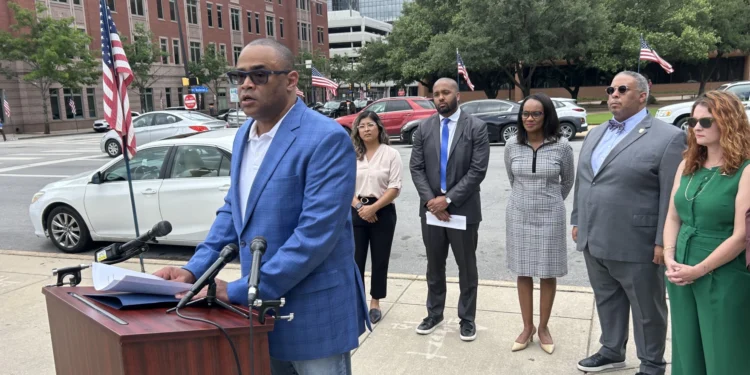May 28, 2025 Story by: Publisher
U.S. Congressman Marc Veasey appeared alongside Commissioner Alisa Simmons, her fellow Democratic County Commissioner Roderick Miles Jr., and members of the Fort Worth City Council to denounce the county’s redistricting attempt. The redistricting would make Democratic County Commissioner Alisa Simmons’ precinct more Republican-friendly before she’s up for reelection next year, past election data shared by the county shows.
Tarrant County Democratic leaders at the national and local level gathered Tuesday at a press conference outside the historic Tarrant County Courthouse in downtown Fort Worth. Veasey said the redistricting effort, led by Republican County Judge Tim O’Hare, targets the county’s growing Black and Hispanic communities.
“We’re not going to be silenced, we’re not going to be erased, and we’re not going to let them drag us back into Jim Crow politics,” Veasey said. Veasey blasted the plan as “an illegal power grab” that “isn’t democracy,” calling it “a demolition job” on minority voting strength. The group argued the process was being rushed without justification or transparency and warned it could violate federal law.
Allegations of racial gerrymandering
The changes, drawn up by Republican County Judge Tim O’Hare with a conservative law firm, would shift large numbers of Black and Hispanic residents out of Commissioner Precinct 2 and into Precinct 1. (Both Precincts 1 and 2 are currently represented by Democrats.)
Veasey noted that Black and Hispanic populations have “surged” in Tarrant County, but charged that Judge O’Hare is “trying to erase that reality. This is intentional racial discrimination that’s unfolding in real time”. In other words, opponents say, the map would dilute minority voting power.
Other local leaders echoed these concerns. Fort Worth Councilwoman Elizabeth Beck said today’s map “is nothing more than Tim O’Hare’s continued effort to silence the voices…of the Black and brown members of our community”.
Ten Tarrant County mayors – including those of Fort Worth, Arlington, Mansfield and Grand Prairie – have formally urged the commissioners to delay the vote, warning that the proposal likely violates the U.S. Voting Rights Act.
Tarrant County Commissioner Roderick Miles, Jr. (D) praised the outcry, saying the mayors’ and civic leaders’ “courage and clarity reflect the growing chorus of voices speaking out for justice, fairness, and local representation”.
Voting rights and legal context
The controversy arrives amid a long history of voting-rights battles in Texas. As one Texas Tribune analysis noted, “since the enactment of the Voting Rights Act in 1965, Texas has not made it through a single decade without a federal court admonishing it for violating federal protections for voters of color”.
Since the 2013 Shelby County v. Holder decision, Texas and other states no longer must obtain Justice Department approval before enacting new maps. That means if Tarrant County’s plan is approved on June 3, it could take effect immediately – even as lawsuits play out in court. Local officials are already warning of legal challenges under the Voting Rights Act. A letter from the ten mayors explicitly warned that the new lines “may violate non-discrimination standards under the U.S. Voting Rights Act and could be vulnerable to legal challenges”.
Republican defense and next steps
Judge O’Hare and his Republican allies say the redistricting is simply overdue. O’Hare has argued that county commission boundaries have not been updated in over a decade, and that population growth in suburban areas calls for new lines. In early April the Commissioners Court approved hiring a conservative law firm to draft five potential maps (and even enlisted the conservative Public Interest Legal Foundation to advise on the redistricting). GOP commissioners have acknowledged their aim is to increase Republican representation on the Court.
Democrats counter that the timing makes no sense: after the 2020 Census the Court voted against any changes, and no new census data is due until 2030.
Commissioner Alisa Simmons noted “we have no new census data…so you’re redrawing the boundaries based on 2020 census data. It just doesn’t make sense”.
The Tarrant County Commissioners Court is set to vote on the redistricting plan on Tuesday, June 3. If the map passes, backers admit it will almost certainly be challenged in federal court.
Without preclearance, however, the map could be implemented pending litigation.
In the days ahead, legal filings and further public hearings are expected, as both sides prepare for a fight that echoes Texas’s long-running battles over racial gerrymandering and voting rights.
Sources: Texas CBS / Tarrant County Redistricting Plan / Texas Tribune

















